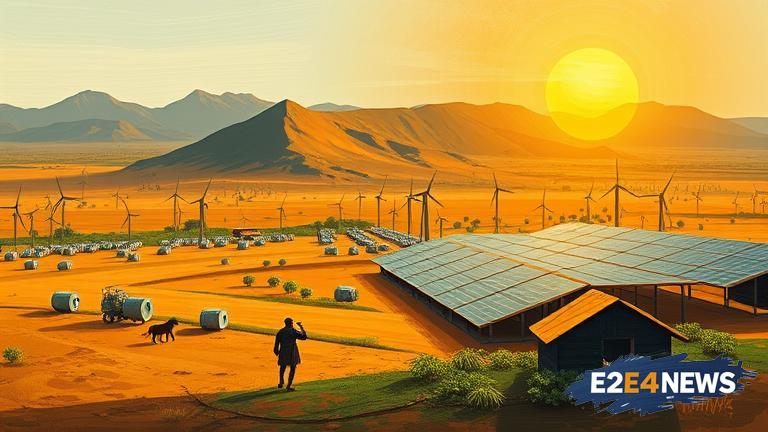The African continent is witnessing a significant shift towards renewable energy, driven by the need to address the pressing issues of energy access, climate change, and sustainable development. With many countries still struggling to provide reliable and affordable electricity to their citizens, renewable energy has emerged as a viable solution. Solar and wind power are leading the charge, with countries like South Africa, Egypt, and Morocco investing heavily in these sectors. The cost of renewable energy technologies has decreased dramatically over the years, making them more competitive with fossil fuels. This has led to a surge in investment, with international organizations and private companies pouring billions of dollars into African renewable energy projects. The African Development Bank has pledged to invest $25 billion in renewable energy by 2025, while the European Union has committed to providing €2.5 billion in funding for African renewable energy projects. The benefits of renewable energy are numerous, including reduced greenhouse gas emissions, improved air quality, and enhanced energy security. Moreover, renewable energy can create jobs, stimulate local economies, and contribute to poverty reduction. However, the transition to renewable energy is not without its challenges. Many African countries lack the necessary infrastructure, expertise, and regulatory frameworks to support the development of renewable energy. Additionally, the high upfront costs of renewable energy technologies can be a barrier to entry for many countries. To overcome these challenges, international cooperation and knowledge sharing are essential. Countries like China, the United States, and Germany are sharing their expertise and technologies with African nations, helping to build capacity and drive innovation. The private sector is also playing a crucial role, with companies like Vestas, Siemens Gamesa, and Enel Green Power investing in African renewable energy projects. Furthermore, innovative financing models, such as green bonds and crowdfunding, are being explored to mobilize capital for renewable energy projects. The impact of renewable energy on African communities is already being felt. In rural areas, solar-powered mini-grids are providing electricity to homes, schools, and healthcare facilities, improving living standards and economic opportunities. In urban areas, renewable energy is powering industries, reducing energy costs, and enhancing competitiveness. As the African renewable energy sector continues to grow, it is likely to have a profound impact on the continent’s economic development, energy security, and environmental sustainability. With the right policies, investments, and partnerships in place, Africa can become a global leader in renewable energy, driving growth, creating jobs, and mitigating climate change. The future of renewable energy in Africa looks bright, with many countries setting ambitious targets to increase their share of renewable energy in the energy mix. For example, South Africa aims to generate 42% of its electricity from renewable sources by 2030, while Egypt targets 20% of its electricity from renewable sources by 2022. Morocco, on the other hand, aims to generate 52% of its electricity from renewable sources by 2030. These targets demonstrate the commitment of African countries to transition to a low-carbon economy and reduce their dependence on fossil fuels. In conclusion, the renewable energy revolution in Africa is gaining momentum, driven by the need to address energy access, climate change, and sustainable development. With the right policies, investments, and partnerships in place, Africa can become a global leader in renewable energy, driving growth, creating jobs, and mitigating climate change.
